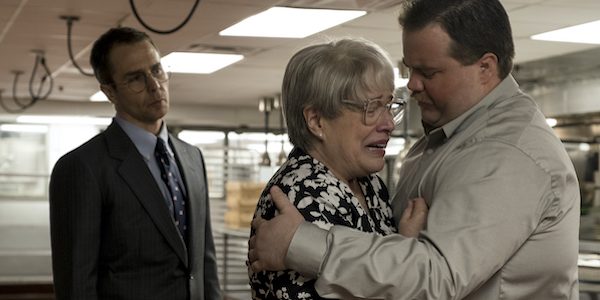
ReelBob: ‘Richard Jewell’ ★★★½
By Bob Bloom
A subconscious irony gnaws at you while watching the new Clint Eastwood-directed movie, “Richard Jewell.”
Here’s the veteran actor who is most associated with playing the lone-wolf cop, most notably in “Dirty Harry” and its sequels, who chafed at the rules and procedures that his character believed molly-coddled criminals and tied law enforcement’s hands.
But, as with most of us, time and experience change our perspectives as we grow older. And, so it seems with Eastwood.
In “Richard Jewell,” it is the FBI who rushes to judgment believing it was Richard Jewell — the security guard who discovered an explosive device in Centennial Park during the 1996 Olympic Games in Atlanta — who planted the bomb.
Eastwood’s criticism isn’t overt; it is done is subtle ways — the method in which Jewell is profiled and immediately becomes the focus of the investigation; the manner in which his identity is leaked to the press; and the media frenzy, which the FBI does not attempt to quell, that makes Jewell’s life a living hell.
As in his 2011 biopic, “J. Edgar,” Eastwood is again showcasing a wariness about “big-government” law enforcement and its potential for abusing power.
All that said, “Richard Jewell,” even at 129 minutes, is a no-frills drama about an individual thrust into the limelight and how that is quickly transformed into a harsh glare of the spotlight.
Paul Walter Hauser, who costarred as the dim-witted Klansman, Ivanhoe in Spike Lee’s “BlacKkKlansman,” stars as Jewell. Hauser’s Jewell is like a real-life caricature of Kevin James’ “Paul Blart, Mall Cop.”
Jewell is heavy set with a round, jowly face and small eyes that, at first glance, emits a vibe that belies his intelligence. He also talks softly and deliberately, which further hides his true nature.
Hauser’s performance is excellent. His transformation from hero to victim to finding his voice makes you root for him, despite knowing the outcome.
Also, Jewell is one of those law-enforcement wannabes. The Georgia resident has worked as a sheriff’s deputy and campus security guard, being fired both times for being too overzealous on the job.
He is hired to work security for the Olympics and, being a very conscientious individual, he remains vigilant throughout his shifts.
Thus, when he sees a backpack under a bench near the venue, he becomes suspicious and alerts authorities, who discover pipe bombs in the pack.
Jewell helps move people to safety before the bombs detonate, which kill two people and injures dozens of others.
At first, he is hailed as a hero. He’s interviewed on television, offered a book deal and is generally praised for his actions.
But the FBI, personified by agent Tom Shaw (Jon Hamm), quickly, after looking into Jewell’s background, mark him as their prime suspect. They believe he is a person wanting validation and recognition, so he planted the bomb, then discovered it to make himself look heroic.
They equate Jewell to a firefighter who sets blazes so he can be saluted for his brave deeds.
Because he sees himself as “law enforcement,” Jewell, at first, cooperates with agents. He slowly realizes that they believe he is responsible for the terrorist act and calls the only lawyer he knows, Watson Bryant (Sam Rockwell).
The best parts of “Richard Jewell” is the interplay between Jewell and Bryant. Despite, Bryant’s advice, Jewell continues to cooperate and talk with Shaw and other agents, because, as he says, he was raised to respect authority and the government.
As Bryant grows more and more frustrated, he finally unleashes his anger at Jewell, not to be cruel, but to make him realize the gravity of his situation.
Kathy Bates is the emotional core of the movie, as Jewell’s supportive mother, Bobi. She beams with pride about her son’s actions but is overwhelmed, confused and heartbroken when it seems the world turns on him.
Because “Richard Jewell” is based on true events, it’s no spoiler to say that he triumphs in the end, with the FBI reluctantly delivering a letter saying he is no longer a target of the investigation.
Eastwood clearly is sympathetic toward Jewell. Smartly, he does not overplay his hand. He portrays the FBI as more shortsighted and the media, as personified by Olivia Wilde’s reporter, Kathy Scruggs, as overly aggressive.
He keeps the story simple and moving forward on a straight line, warning that a combination of police wanting to solve a big case quickly and a media hungry for scoops and headlines can be a fearsome combination that can swallow an individual whole without a second thought.
I am a founding member of the Indiana Film Journalists Association. My reviews appear at ReelBob (reelbob.com) and Rottentomatoes (www.rottentomatoes.com). I also review Blu-rays and DVDs. I can be reached by email at bobbloomjc@gmail.com or on Twitter @ReelBobBloom. Links to my reviews can be found on Facebook, Twitter and LinkedIn.
RICHARD JEWELL
3½ stars out of 4
(R), language, sexual references, bloody images
